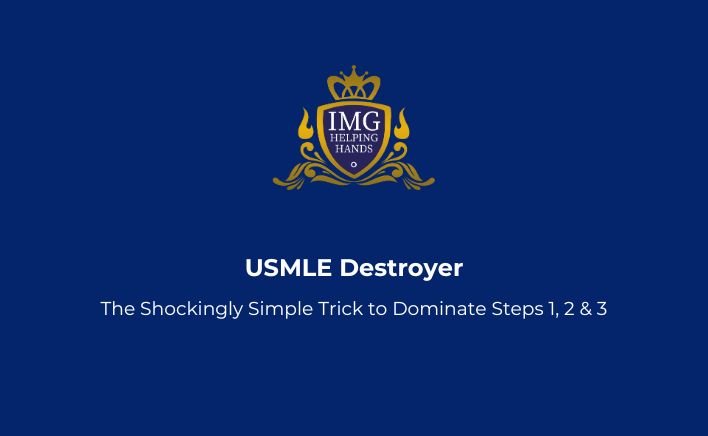

From the first days of medical school, the letters “USMLE” loom large for all students who dream of becoming licensed physicians. The United States Medical Licensing Examination is the formidable test standing between graduation and residency. Like a rite of passage, conquering this exam is essential for anyone seeking to practise medicine in the U.S.
However, the USMLE’s multi-step structure covering complex sciences and clinical applications trips up many on the path to licensure. Failing to properly prepare can abruptly halt a medical career. But dedicating the necessary time and resources to USMLE success is no easy feat with the rigours of medical education.
The key is to start preparing early by learning optimal study approaches, resources and schedules. Treat preparation like a marathon rather than a cram session. With smart and thorough preparation, this licensing giant can be tackled with confidence.
Textbooks provide the core foundation of knowledge across the basic and clinical sciences tested on the USMLE. Popular options like First Aid for the Boards, Kaplan Medical, and Goljan cover subjects in great depth. Selecting reputable textbooks early allows sufficient time to study content.
Condense textbook knowledge into high-yield facts and concepts with streamlined review books like First Aid, Pathoma, and Sketchy Medical. Their focus on key principles makes retaining information more manageable.
Applying knowledge requires practice. UWorld, Kaplan Qbank, and USMLE-Rx provide thousands of high quality practice questions to develop critical thinking and time management skills. Mimicking these vital real-world exam conditions is crucial.
Strategically selecting textbooks for deep dives into content, review materials to simplify key concepts, and practice questions to cultivate test-taking skills provides the ideal USMLE prep toolbox. Begin assembling these resources from day one.
Want a proven blueprint for USMLE success? Visit our website to get full prep guides, secret tactics from top scorers, and expert coaching to start dominating these exams beginning on day one.
With a solid 6+ months minimum recommended for Step 1 prep, blocking out focused chunks of study time well in advance is key. Identify gaps in your calendar to map out a routine for textbook reading, reviewing condensed notes, and practising questions. Be consistent and realistic when estimating time commitments.
Breaking overall preparation into smaller milestones keeps motivation high and prevents rushing. Set weekly and monthly goals like completing textbook chapters, generating flashcards, or passing practice tests. Check off accomplishments to visualise your progress.
Simulate the real test environment every few weeks by taking timed practice exams. This gauges retention and improvement areas while acclimating you to the test structure. Review incorrectly answered questions. Use your baseline, peaks and valleys to adjust study focus.
Careful scheduling, incremental goals, and practice tests provide the study roadmap for USMLE success. Commit your prep timeline to writing. Consult mentors to ensure adequate time is planned for the long journey ahead. With a map in hand, you’ll arrive at test day focused and confident.
Simply glancing at textbooks is not enough be an engaged, active reader. Highlight key facts, annotate principles, create charts/tables to visually summarise, and take handwritten notes for better retention. Generate flashcards on important concepts to carry and review on the go.
Re-read textbooks and condensed review books to solidify earlier learning. As test day nears, focus on memorising flashcards, notes, diagrams, and high yield charts that distill key facts. Repeatedly review this content across multiple days to aid long-term memory storage and recall.
Applying knowledge requires testing it under realistic conditions. UWorld, Kaplan, and other question banks provide this vital practice. Work through questions untimed at first while deeply analysing both correct and incorrect answers to learn. Then take timed, simulated exams periodically. Review mistakes and look up unknown concepts.
Once a solid content foundation is built, place yourself in the real testing environment. Take full-length timed practice exams in a quiet room without distractions. Strictly follow timing and break schedules. Mimic travel, food, clothing, and timing of the actual test day to acclimate yourself mentally and physically.
Progressively take more back to back practice tests to increase mental endurance for the 6+ hour exam marathon. Practice focusing intently for long periods. Work on time management skills while fatigued. Review mistakes diligently to reinforce gaps. The USMLE is an endurance sport.
Between medical education rigor and high exam stakes, USMLE prep induces incredible stress. Actively focus on lifestyle balance, proper sleep, socializing with peers, exercising, pursuing hobbies, and taking study breaks. Seek counseling if needed. Stress management now prevents burnout down the road.
Speaking openly about the challenges with family, friends, mentors, and those who have already taken the test provides emotional release andPerspective from veterans helps normalize the demands. Feeling connected makes the process less solitary.
To achieve USMLE success, studiously absorb textbooks, repeatedly review materials, actively practice test taking, simulate exam day conditions, build mental endurance, and proactively manage stress. Follow this roadmap and you will be prepared for this licensing journey.
Preparing for the intense demands of the USMLE requires starting early with a thoughtful approach. First, assemble a robust set of textbooks, review materials, and practice questions that align to each exam’s content. With resources in hand, diligently schedule blocks of study time daily, weekly, and monthly dedicated to active reading, review, and practice. Incremental goals keep motivation high. Taking periodic practice tests under timed conditions is crucial to evaluate one’s progress and gaps while acclimating to the real test environment.
Get our most valuable tips right inside your inbox, once per month!